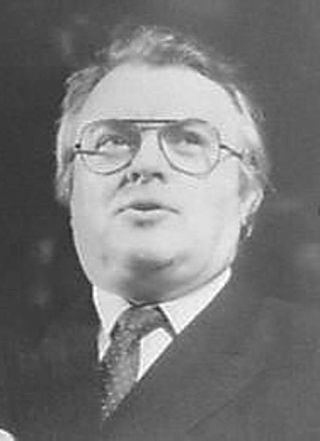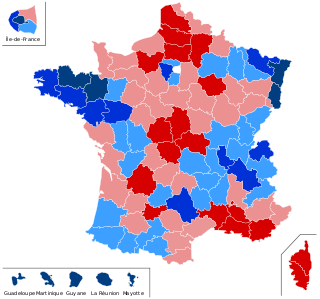Related Research Articles

François Marie Adrien Maurice Mitterrand was President of France from 1981 to 1995, the longest holder of that position in the history of France. As First Secretary of the Socialist Party, he was the first left-wing politician to assume the presidency under the Fifth Republic.

Michel Rocard was a French politician and a member of the Socialist Party (PS). He served as Prime Minister under François Mitterrand from 1988 to 1991 during which he created the Revenu minimum d'insertion (RMI), a social minimum welfare program for indigents, and achieved the Matignon Accords regarding the status of New Caledonia. He was a member of the European Parliament, and was strongly involved in European policies until 2009. In 2007, he joined a Commission under the authority of Nicolas Sarkozy's Minister of Education, Xavier Darcos.
Georges René Louis Marchais was the head of the French Communist Party (PCF) from 1972 to 1994, and a candidate in the 1981 French presidential election.

Presidential election were held in France in 1974, following the death of President Georges Pompidou. They went to a second round, and were won by Valéry Giscard d'Estaing by a margin of 1.6%. It is to date the closest presidential election in French history.

French legislative elections took place on 21 and 28 March 1993 to elect the tenth National Assembly of the Fifth Republic.

French legislative elections took place on 5 and 12 June 1988, to elect the ninth National Assembly of the Fifth Republic, one month after the re-election of François Mitterrand as President of France.

French legislative elections took place on 14 June and 21 June 1981 to elect the seventh National Assembly of the Fifth Republic.

French legislative elections took place on 4 and 11 March 1973 to elect the fifth National Assembly of the Fifth Republic.

The Federation of the Democratic and Socialist Left was a conglomerate of French left-wing non-Communist forces. It was founded to support François Mitterrand's candidature at the 1965 presidential election and to counterbalance the Communist preponderance over the French left.

Alain Savary was a French Socialist politician, deputy to the National Assembly of France during the Fourth and Fifth Republic, chairman of the Socialist Party (PS) and a government minister in the 1950s and in 1981–1984, when he was appointed by President François Mitterrand as Minister of National Education.
The Democratic and Socialist Union of the Resistance was a French political party founded after the liberation of France from German occupation and mainly active during the Fourth Republic (1947–58). It was a loosely organised "cadre party" without mass membership. Its ideology was vague, including a broad diversity of different political convictions, and it was variously described as left-wing, centrist, and even conservative. It was decidedly anti-communist and linked with the Paix et Liberté movement. The UDSR was a founding member of the Liberal International in 1947.
The Epinay Congress was the third national congress of the French Socialist Party, which took place on 11, 12 and 13 June 1971, in the town of Épinay-sur-Seine, in the northern suburbs of Paris. During this congress, not only did the party admit the Convention of Republican Institutions into its ranks, but the party leadership was also won by Mitterrand and his supporters. For the observers and the French Socialists themselves, the Epinay Congress was the real founding act of the current PS. It was also the turning point in Mitterrand's grand political plan, which led to the ascendancy of the French Left over the next quarter-century, and eventually, in 1981, to Mitterrand's election to the Presidency of France for two consecutive 7-year terms.
The Metz Congress was the seventh national congress of the French Socialist Party which took place on 6, 7 and 8 April 1979. The debate was influenced by the failure to update the Common Programme with the French Communist Party, and the unexpected defeat of the "Union of Left" at the 1978 legislative election.
The Rennes Congress was the thirteenth national congress of the French Socialist Party. It took place from 15 to 18 March 1990.

A referendum on the Maastricht Treaty was held in France on 20 September 1992. It was approved by only 51% of the voters. The result of the referendum, known as the "petit oui", along with the Danish "No" vote are considered to be signals of the end of the "permissive consensus" on European integration which had existed in most of continental Europe until then. From this point forward issues relating to European integration were subject to much greater scrutiny across much of Europe, and overt euroscepticism gained prominence. Only France, Ireland and Denmark held referendums on Maastricht ratification.
The Pau Congress was the fifth national congress of the French Socialist Party. It took place from 31 January to 12 February 1975. The "Epinay Coalition" between Mitterrand and Chevènement's CÉRÉS group ended and CÉRÉS joined the minority.
The Grenoble Congress was the fourth national congress of the French Socialist Party. It took place from 22 to 24 June 1973.
The Créteil Congress was the eight national congress of the French Socialist Party. It took place on 24 January 1981. François Mitterrand was unanimously approved as the party's candidate in the 1981 presidential election, which he eventually won.
The Issy-les-Moulineaux Congress was the second national congress of the French Socialist Party. It took place on July 11 to 13, 1969. This marked the transformation of the old French Section of the Workers' International (SFIO) into the new PS. However, François Mitterrand's Convention of Republican Institutions did not attend.

The Socialist Party is a French centre-left and social-democratic political party. It holds pro-European views. The PS was for decades the largest party of the "French Left" and used to be one of the two major political parties in the French Fifth Republic, along with The Republicans. It replaced the earlier French Section of the Workers' International in 1969 and is currently led by First Secretary Olivier Faure. The PS is a member of the Party of European Socialists, Progressive Alliance and Socialist International.
References
- ↑ PS Congresses since 1971, France-politique